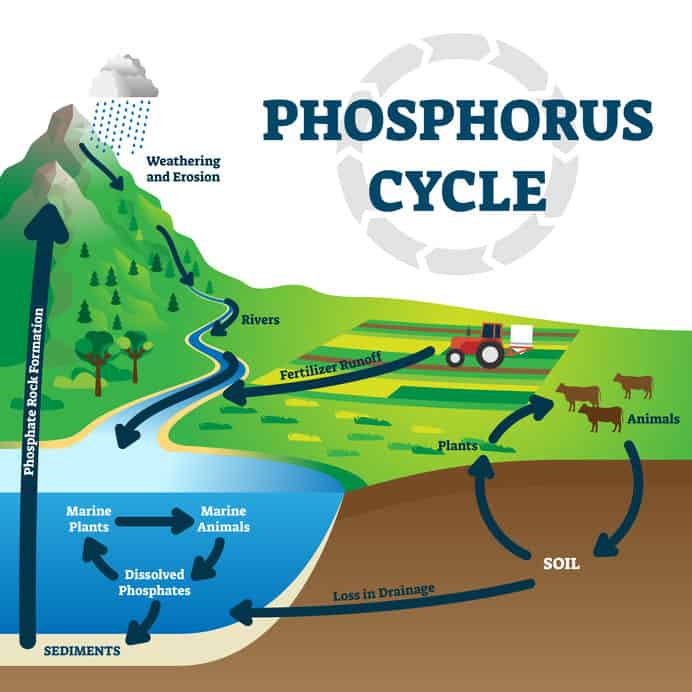A high level of phosphates in your salt water pool water can be caused by a number of different factors mostly related to things that are introduced to the water by humans either directly or indirectly. A low level of phosphorus in your pool water isn’t really something to worry about unless levels get to a high range and algae becomes a problem.
The key to getting rid of high phosphates is first to understand exactly what phosphates are and to recognize that they’re always going to be in your pool water to some degree. The best thing you can do is keep phosphates in check through proper water chemistry and pool maintenance.
When pool water level, pH, chlorine and salt levels are within range and when algae isn’t an active problem in your pool, phosphates really aren’t something you have to worry about. When phosphate levels are in the 100-125 ppm range there is nothing to worry about but if they reach 500 ppm, the level is too high and may need to be treated.
Phosphates In Pool Water
How do you know you have phosphates in your salt water pool? Well, chances are you do have them in your pool at most if not all times. The good news is that they’re not harmful and at low levels with good pool chemistry, you don’t need to do anything about them.
Simple pool water tests like water strips generally don’t test for phosphates so you really don’t know how high your level is unless you start to see fuzzy stuff in your pool or in the skimmer or filter. That’s how I first discovered phosphates in our pool and went to speak with our pool company to learn more about what to do. They sold me a bottle of phosphorous remover which I poured into the water to get rid of it.
The next day I had even more (dead) phosphorous floating on the top of water which I had to to scoop out and vacuum from the pool. I then rinsed our cartridge filter mediums to remove the phosphates from the pool system completely.
And if you have a bad algae outbreak, that’s a sign that phosphates are at a high level because algae feeds off it. At this point, you also have to deal with algae and get rid of that too. When algae dies, it releases phosphorus too so it’s a never ending cycle unless you quickly put a stop to it.

Signs Of High Phosphates In Pool Water
As mentioned above, I first noticed fuzzy debris floating in the pool and a cloudiness that I hadn’t noticed previously.
And as we also mentioned above, an algae outbreak is another sign of high phosphate levels in pool water. Algae feeds off of phosphorus and hot sunny weather but when chlorine levels are within range and pool chemistry in general is good, algae is kept at bay and shouldn’t be a problem.
Keeping Phosphates In Check
Phosphates typically come from a wide variety of sources, the main ones being:
- Fertilizers and pesticides used in your garden or from your neighbors.
- Leaves, twigs, branches and dirt blown into the pool.
- Phosphorus-based pool cleaners.
- Detergents brought into the pool by swimmer who wear swimming suits and clothing washed with phosphorus-based washing soaps.
Limiting your pool’s exposure to these and other contaminants helps to keep the phosphorus levels in check. Also keeping proper pool chemistry – maintaining chlorine levels specifically – helps to ensure that phosphate levels are not something to worry about.
Reducing Phosphates In Your Pool
We just discussed how phosphates typically enter your pool. Obviously limiting these sources will reduced phosphate levels. But there are other things you can do to limit phosphates in your pool.
Skim the pool water: Use your pool skimmer to remove all visible leaves floating on the pool. Since they may have phosphates on them, the quicker you remove them the less phosphorus you will have in your pool water.
Vacuum regularly: When leaves, twigs, etc settle on the bottom of the pool, not only can they bring more phosphates into the water, they degrade and rot which dirties your pool more and uses up chlorine. Vacuum up visible debris on the floor of the wall and regularly brush pool walls and the floor before and in between vacuuming.
Rinse or backwash filter: Sand and D.E. filters should be backwashed as required and cartridge filters should be rinsed as necessary. This keeps the filters working properly but also ensures that contaminants are completely removed from the pool system and aren’t returned to the pool water.
Shocking your pool: Essentially, keep your water chemistry in check, maintain proper pH, chlorine and salt levels and also keep an eye on water level. Heavy rain increases water levels and can impair water chemistry which can promote algae growth. Shocking your pool with chemical chlorine or using the Super Chlorinate feature on your pool chlorinator ensure that chlorine levels are high enough that phosphates and algae aren’t a problem to begin with.
Conclusion
Phosphates can enter your pool in a variety of ways. A reasonably low level of phosphorus in your pool (100 – 125 ppm) is not a problem but once algae appears it’s a sign that phosphate level is high. You can limit the amount of phosphorus entering your pool by reducing or eliminating your use of chemical fertilizers and pesticides that contain phosphorus. You should also keep pool water chemistry in check and within acceptable ranges as this is the best way to ensure that whatever low phosphorus level you have in your pool is largely insignificant.

